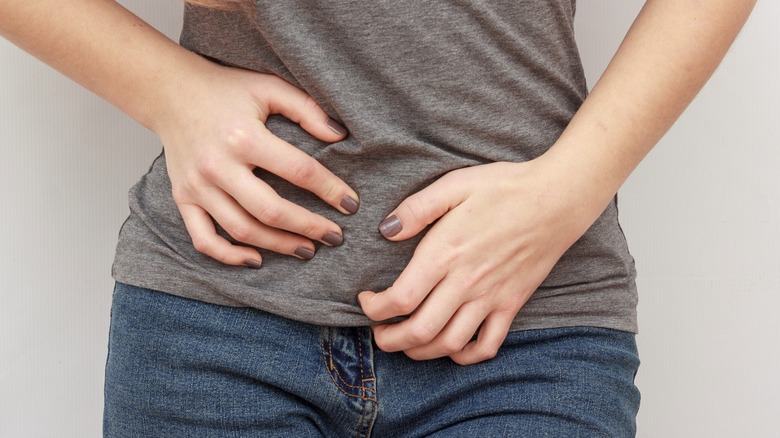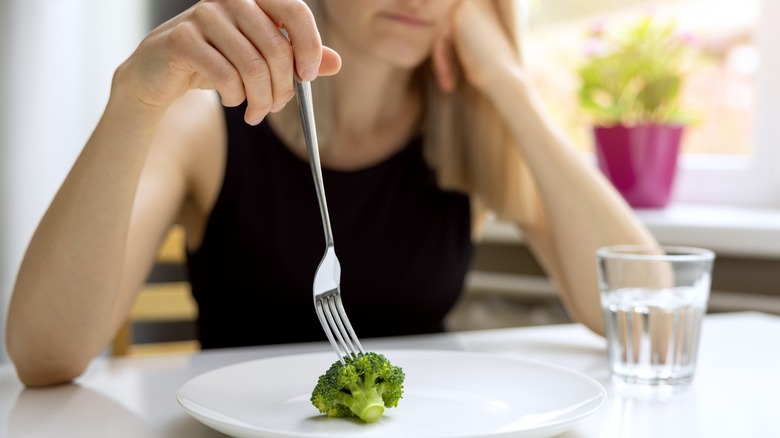If You Lose Weight Too Quickly, This Is What Happens To Your Body
Weight loss, often viewed as the golden ticket to a healthier, happier life, can turn into a double-edged sword if you pursue your goals too aggressively.
In our efforts to get svelte fast for a special occasion or because we want to fit into a favorite pair of jeans, we can easily forget that our bodies are intricate machines composed of cells, tissues, organs, and systems that collaborate in complex ways to support the body's total well-being. Before allowing yourself to be drawn in by the allure of quick fixes, it's vital to understand what happens to your body and the many risks that can occur in how it responds when you try to lose weight too quickly.
Healthcare2U reports that roughly 45 million Americans annually go on at least one diet, with about half stating that they went on a "fad diet." Fad diets make proposed claims that often go against the scientific foundations of biochemistry and proper nutrition by requiring the elimination of certain food groups to facilitate quick weight loss. Yet, minimal evidence exists to back these claims. In the meantime, research indicates that following these weight-loss practices long-term will often lead to adverse health consequences, according to a study of various fad diets in Frontiers in Nutrition.
There is almost always a price to pay when engaging in fad diets and other types of extreme caloric restrictions when desiring to lose weight quickly. Here are some examples of the many downsides that can result from these practices, per WebMD.
Muscle loss
Among the multitude of negative repercussions that can result from rapid weight loss, one of the most concerning is muscle loss. When the body is deprived of sufficient calories, it breaks down muscle for energy, which can impact your overall health.
You may think that when you go on a diet, you're only losing fat, but whether you are lean or obese research indicates that when you diet, you lose a significant amount of muscle mass, according to The Conversation.
Dr. Jaime Almandoz, an associate professor of internal medicine in the Division of Endocrinology at UT Southwestern Medical Center in Dallas, explains to NBC News that about one-third of the weight you shed through weight-loss intervention is lean mass, which includes muscle. Lean mass is associated with improved metabolism, so when you lose too much muscle, this can impact your metabolism. For instance, adequate muscle mass allows you to burn more calories when you are at rest. So in an ironic twist, if you reduce your muscle mass by too much as you lose weight quickly, the rate at which you burn calories is reduced. Moreover, the shorter the time it takes you to lose weight, the more pronounced the loss of muscle mass as your body looks to muscle and fat for more energy.
To mitigate muscle mass loss while trying to lose weight, shoot for consuming 60 to 80 grams of protein daily through food and supplements and exercise regularly, with a focus on resistance training.
Nutritional deficiencies
Quick weight loss often results in a lack of essential nutrients, as restrictive diets may not provide a balanced intake of vitamins and minerals.
When you eat a balanced diet, you're providing your body with all the nutritional support it requires to execute complex functions. When you deprive yourself of vitamins, minerals, carbohydrates, fats, and protein, you put your health at risk. An article in Oklahoma State University (OSU) Extension points out that the rise in obesity in recent years amid the popularity of social media is putting pressure on more people to lose weight quickly to achieve an Instagramable look. To accomplish this, dieters may try diets that promise short-term weight loss by eating minuscule portions of food or eliminating certain food groups.
Nutritional deficiencies can develop within weeks or, in some cases, a matter of days (per Stewart Nutrition). Some symptoms of nutritional deficiencies may include a loss of appetite, low energy levels, and increased vulnerability to infections. For instance, vitamin B1 (thiamine) is naturally occurring in fish, meat, and whole grains. If you deprive yourself of enough B1 by not consuming fish, beans, enriched cereals, or yogurt, you are at risk of causing a mild or moderate deficiency, according to Harvard T.H. Chan School of Public Health. Consequently, you may experience confusion or memory loss, weaker muscles, lowered immunity, or peripheral neuropathy, which is when there is damage to the nerves in the body's extremities. To lose weight effectively and safely, your best approach is a less restrictive diet that includes all five food groups, per OSU Extension.
Metabolic slowdown
Metabolism is a vital and complex chemical process that requires enough calories to function correctly. Drastic calorie reduction can slow down your metabolism, making it more challenging to maintain a healthy weight in the long term.
The experts at Cleveland Clinic explain that you need minimum amounts of vitamins and minerals to fuel your body's metabolism, which supports key functions such as digestion and breathing. The minimum calorie threshold needed to support these functions is called your basal metabolic rate (BMR). During metabolism, the calories in the food and drinks you consume combine with oxygen and convert to energy. Your body requires about 10% of its energy for this conversion process, using its remaining energy for physical movement. Your body constantly needs metabolism, even while resting. In addition to breathing and digestion, metabolism also plays a key role in blood circulation, cell growth and repair, hormone management, and body temperature regulation.
By restricting the calorie intake your body needs to support your metabolic processes, your body ends up using fewer calories towards metabolism to preserve energy, consequently slowing your metabolism down (per Lloyds Pharmacy). Slowing your metabolism doesn't only make it more challenging to lose weight and easier to regain weight; it also puts you at risk of developing serious health issues such as heart disease, type 2 diabetes, and strokes. Instead, experts advise that you take a safe approach to weight loss by aiming to lose weight gradually (no more than two pounds weekly) while upping your exercise.
Gallstones
Your gallbladder is a pear-shaped sac beneath your liver that stores bile, a digestive fluid produced by the liver. Normally, bile is released from the gallbladder into your small intestine, where it aids in digestion by breaking up fats into fatty acids. However, rapid weight loss increases the risk of developing gallstones, lumps of hardened bile that can form within your gallbladder.
Healthline explains that gallstones form when you lose weight too quickly because if you're not consuming enough food, the gallbladder doesn't need to release the digestive juices normally required to break down fat. When the digestive juices sit, substances that normally flow out of the gallbladder may join together, forming a gallstone, which can get stuck and cause an attack.
Signs and symptoms may not always appear if you have a gallstone, per the Mayo Clinic. However, if one gets lodged and causes a blockage, you may experience sudden and intense pain in the center or upper right area of your abdomen, or pain in your right shoulder or upper back between your shoulder blades. Pain due to gallstones can last anywhere from a few minutes to a few hours. Other symptoms include nausea or vomiting. Gallstones are not only painful; they can also lead to other serious complications. See a doctor immediately if you experience severe abdominal pain, yellowing of your skin or in the whites of your eyes (jaundice), or a high fever with chills.
Fatigue
If you lose weight too quickly, you put yourself at risk of insufficient calorie intake, which can lead to fatigue and reduced energy levels.
You may normally associate being overweight with fatigue, since dragging around those extra pounds can, well, weigh on you. However, the opposite can also be true. For example, losing weight quickly via a restrictive diet can cause stress or anxiety, which can lead to extreme fatigue, according to the staff at LIMARP, an internationally accredited bariatric center. Because losing weight quickly often involves limiting your food intake, you're also limiting your energy intake. Consequently, you may discover that you're persistently tired, especially if you're simultaneously increasing your daily physical activity. If fatigue persists, you are at risk of malnutrition due to a potential lack of common nutrients such as magnesium and vitamins B12, C, and D. Additionally, you may be putting yourself at risk of low iron, which can lead to anemia.
"Carbohydrate" is a dirty word to many trying to lose weight quickly, yet you need to include high-quality carbohydrates, such as whole grains, vegetables, fruits, and beans, as part of a healthy diet to have enough glucose for the body to use for energy. Cutting out good carbs can cause dehydration, which often leads to fatigue. Sure, avoid bad carbs such as desserts, white bread, sugary sodas and juices, and highly processed foods, but Elizabeth DeRobertis, a registered dietitian and director of the Nutrition Center at Scarsdale Medical Group, White Plains Hospital, tells CNN not to deprive yourself of those high-quality, fiber-rich carbs.
Hormonal fluctuations
Rapid weight loss can disrupt hormonal balance, affecting menstruation and potentially causing reproductive issues. Following a weight-loss regimen that requires you to cut out important components of a balanced diet, such as certain types of cholesterol, good carbohydrates, and healthy fats, does a number on your endocrine system (per The Marion Gluck Clinic).
The endocrine system is an intricate network made up of cells, glands, and organs. From conception to old age, this complex system produces hormones (also known as chemical messengers) that coordinate and regulate a host of essential biological processes, including metabolism, blood sugar control, energy level, body growth and development, injury response, stress, mood, and the reproductive system. Consequently, women who lose weight too quickly could potentially experience amenorrhea. A woman has this condition when she misses three or more months of her menstrual cycle. Additionally, if your body fat gets too low, you are at greater risk of infertility.
As endocrinologist Dr. Vinni Makin tells Cleveland Clinic, the reason a woman's period stops due to extreme weight loss is because when you lose weight too quickly, you put your body under stress. The stress leads to a fight-or-flight response, causing your body to conserve energy by reducing hormone production for functions that the body doesn't immediately require, so there is enough energy to support vital processes such as breathing and digesting.
To keep your hormones at healthy levels, The Marion Gluck Clinic advises you to keep your meal plates composed of 40% vegetables, 30% grains, 20% lean proteins, and 10% healthy fats.
Electrolyte imbalance
Severely restricting your calorie intake puts you at risk of electrolyte imbalances, which can impact heart and muscle function. WebMD explains that electrolytes are minerals, such as calcium, potassium, phosphorus, and sodium, that carry electric charges when dissolved in liquid, such as your blood. Electrolytes play a vital role in many processes, including regulating your heart rhythm and helping to control muscle function.
When you lose weight too quickly as a result of removing foods from your diet that provide essential minerals, you put your health at increased risk. For example, low levels of electrolytes can negatively affect your muscle function, leading to spasms, cramps, reflex issues, and, in extreme cases, paralysis. Regarding your heart, low phosphorus levels are linked to a higher risk of heart failure, seizures, and even coma.
If you combine intense exercise with a restrictive diet, losing water will further increase your loss of electrolytes, according to Piedmont Healthcare. Symptoms of an electrolyte imbalance include dizziness, cramps, an irregular heartbeat, and mental confusion. So, hydration is important for maintaining electrolyte levels. Nonetheless, the best approach to ensure you have the proper amount of minerals while trying to lose weight is to eat a balanced diet. Some foods that can help maintain your mineral levels include spinach, which is rich in magnesium, calcium, and vitamins A and K, lentils, which contain magnesium, potassium, and phosphorus, and dried apricots, which are a great source of potassium (per WebMD).
Dizziness and fainting
Low blood sugar levels can result from rapid weight loss, leading to dizziness and fainting episodes.
Though there could be many reasons why you feel dizzy, if you are undereating or skipping meals so that you can lose weight quickly, this practice could likely be the culprit. Per Healthline, not eating enough can cause hypoglycemia, or low blood sugar. This situation can cause dizziness or fainting because the glucose in your blood, which is an essential energy source for your brain, results from your digestion of carbohydrates. So if you avoid carbohydrates, or don't eat enough in general to get the proper amount of calories, you put yourself more at risk for a shortage of fuel and a drop in blood sugar, which could lead to dizziness.
If you are trying to lose weight quickly by adhering to a low-carbohydrate diet and feel dizzy or faint, another reason you may be having this experience is because you are not consuming enough sodium, according to Lindora. Normally, the food we consume has enough sodium, which helps to maintain the balance of fluids in the blood vessels. In addition to dizziness, low sodium levels can also cause muscle weakness, muscle cramps, fatigue, and lack of energy. If you're feeling dizzy or faint while dieting, adding table salt to your food or drinking one cup of bouillon twice daily could help remedy this issue.
Not consuming enough water can also cause dizziness or lightheadedness. So always make sure you're hydrating enough, whether or not you're trying to lose weight (per Cleveland Clinic).
Yo-yo dieting
If you've tried to lose weight quickly more than a few times, you may have noticed some common issues that resurface over and over, such as unsustainable habits, bad eating habits, and yo-yo dieting cycles.
If you don't want to regain the weight you lose, then don't go on a diet where you lose weight too quickly. WebMD reports that one in three people who go on a diet pushing fast weight loss regain their weight back in a year. If you're lucky enough to keep some of the weight off for a year, chances are high that you'll regain it all in five years, which is what happens to most dieters who adhere to rapid weight loss regimens.
One reason for this weight gain is a lack of the hormone leptin. Your fat cells produce leptin, which sends the message to the brain that you have adequate fat stored up. When you don't have enough fat cells producing leptin, your hunger increases. At the same time, your body slows things down to conserve energy. So after quitting your diet, you're left with a huge appetite while burning fewer calories. In other words, this is a losing combination that will leave you heavier than when you started, especially if you go through several cycles of this yo-yo dieting pattern.
If you want to maintain weight loss, follow healthy approaches to set yourself up for success. For example, Piedmont Healthcare advises practicing mindful eating, eating regularly, drinking water before eating to confirm you're truly hungry as opposed to bored, and maintaining an exercise routine.










